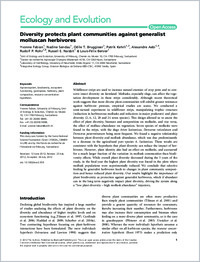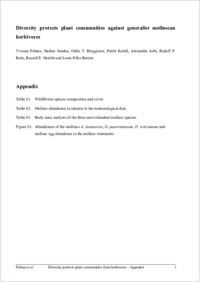Diversity protects plant communities against generalist molluscan herbivores
- Fabian, Yvonne Unit of Ecology and Evolution, University of Fribourg, Switzerland
- Sandau, Nadine Unit of Ecology and Evolution, University of Fribourg, Switzerland
- Bruggisser, Odile T. Unit of Ecology and Evolution, University of Fribourg, Switzerland
- Kehrli, Patrik Unit of Ecology and Evolution, University of Fribourg, Switzerland - Station de recherche Agroscope Changins Wädenswil ACW, Nyon, Switzerland
- Aebi, Alexandre Unit of Ecology and Evolution, University of Fribourg, Switzerland - Laboratory of Soil Biology, University of Neuchâtel, Switzerland
- Rohr, Rudolf P. Unit of Ecology and Evolution, University of Fribourg, Switzerland - Integrative Ecology Group, Estacion Biologica de Doñana, Sevilla, Spain
- Naisbit, Russell E. Unit of Ecology and Evolution, University of Fribourg, Switzerland
- Bersier, Louis-Félix Unit of Ecology and Evolution, University of Fribourg, Switzerland
-
31.08.2012
Published in:
- Ecology and Evolution. - 2012, vol. 2, no. 10, p. 2460-2473
English
Wildflower strips are used to increase natural enemies of crop pests and to conserve insect diversity on farmland. Mollusks, especially slugs, can affect the vegetation development in these strips considerably. Although recent theoretical work suggests that more diverse plant communities will exhibit greater resistance against herbivore pressure, empirical studies are scarce. We conducted a semi-natural experiment in wildflower strips, manipulating trophic structure (reduction in herbivorous mollusks and reduction in major predators) and plant diversity (2, 6, 12, 20 and 24 sown species). This design allowed us to assess the effect of plant diversity, biomass and composition on mollusks, and vice versa, the effect of mollusc abundance on vegetation. Seven species of mollusks were found in the strips, with the slugs Arion lusitanicus, Deroceras reticulatum and Deroceras panormitanum being most frequent. We found a negative relationship between plant diversity and mollusk abundance, which was due predominantly to a decrease in the agricultural pest species A. lusitanicus. These results are consistent with the hypothesis that plant diversity can reduce the impact of herbivores. However, plant identity also had an effect on mollusks, and accounted for a much larger fraction of the variation in mollusk communities than biodiversity effects. While overall plant diversity decreased during the 3 years of the study, in the final year the highest plant diversity was found in the plots where mollusk populations were experimentally reduced. We conclude that selective feeding by generalist herbivores leads to changes in plant community composition and hence reduced plant diversity. Our results highlight the importance of plant biodiversity as protection against generalist herbivores, which if abundant can in the long term negatively impact plant diversity, driving the system along a “low plant diversity – high mollusk abundance” trajectory.
- Faculty
- Faculté des sciences et de médecine
- Department
- Département de Biologie
- Language
-
- English
- Classification
- Biological sciences
- License
-
License undefined
- Identifiers
-
- RERO DOC 30410
- DOI 10.1002/ece3.359
- Persistent URL
- https://folia.unifr.ch/unifr/documents/302527
Other files
Statistics
Document views: 124
File downloads:
- pdf: 185
- Supplementary material: 197

